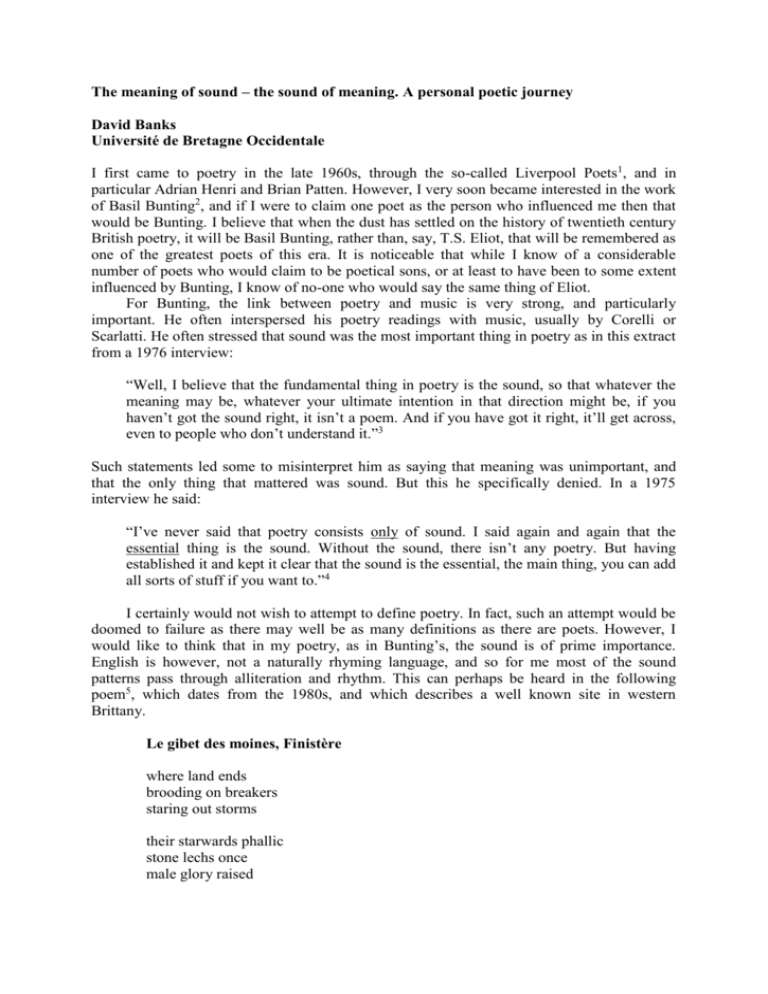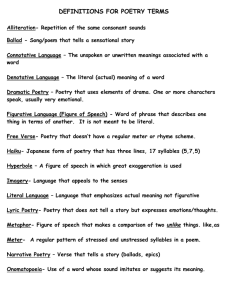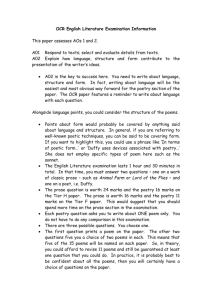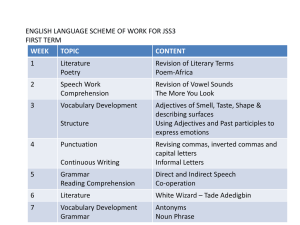CEIMA art-2010 - Université de Bretagne Occidentale
advertisement

The meaning of sound – the sound of meaning. A personal poetic journey David Banks Université de Bretagne Occidentale I first came to poetry in the late 1960s, through the so-called Liverpool Poets1, and in particular Adrian Henri and Brian Patten. However, I very soon became interested in the work of Basil Bunting2, and if I were to claim one poet as the person who influenced me then that would be Bunting. I believe that when the dust has settled on the history of twentieth century British poetry, it will be Basil Bunting, rather than, say, T.S. Eliot, that will be remembered as one of the greatest poets of this era. It is noticeable that while I know of a considerable number of poets who would claim to be poetical sons, or at least to have been to some extent influenced by Bunting, I know of no-one who would say the same thing of Eliot. For Bunting, the link between poetry and music is very strong, and particularly important. He often interspersed his poetry readings with music, usually by Corelli or Scarlatti. He often stressed that sound was the most important thing in poetry as in this extract from a 1976 interview: “Well, I believe that the fundamental thing in poetry is the sound, so that whatever the meaning may be, whatever your ultimate intention in that direction might be, if you haven’t got the sound right, it isn’t a poem. And if you have got it right, it’ll get across, even to people who don’t understand it.”3 Such statements led some to misinterpret him as saying that meaning was unimportant, and that the only thing that mattered was sound. But this he specifically denied. In a 1975 interview he said: “I’ve never said that poetry consists only of sound. I said again and again that the essential thing is the sound. Without the sound, there isn’t any poetry. But having established it and kept it clear that the sound is the essential, the main thing, you can add all sorts of stuff if you want to.”4 I certainly would not wish to attempt to define poetry. In fact, such an attempt would be doomed to failure as there may well be as many definitions as there are poets. However, I would like to think that in my poetry, as in Bunting’s, the sound is of prime importance. English is however, not a naturally rhyming language, and so for me most of the sound patterns pass through alliteration and rhythm. This can perhaps be heard in the following poem5, which dates from the 1980s, and which describes a well known site in western Brittany. Le gibet des moines, Finistère where land ends brooding on breakers staring out storms their starwards phallic stone lechs once male glory raised till tonsured scouts with upturned female symbols topped them off thus circumcised if not castrated by these rough hewn crosses providing gibbets for their time and tourist sights for ours slim-fit monolilths still Christ cross the countryside stalking pagans the same sea shifts the schist Many of my poems are derived from visits to more or less exotic places: Iceland, Iraq, Yemen, Algeria, Jordan, etc. I also think that the poet should be able to say something about the political and social events of his time. When the Iraqis gassed the Kurdish village of Halabja in 1988, I was reminded of my experiences in Iraqi Kurdistan in 1976. Although I never went to Halabja, I did go to Amadiyah, which was also subject to gas attacks. All of the events mentioned in this poem actually happened. Kurdistan 1976/1988 the day we fled from Amadiyah arab jeep behind us down the Kurdish mountain road there was no gas though crowds of Kurdish eyes watched the lone Arab fail to get our papers the day they stopped us on the road from Rowanduz bullet pocked villages napalm scars across the valley there was no gas though a pistol in a trouser belt was held anonymous authority for search and question the day we passed through Gully Ali Beg ironic poppies blinking above the surging summer waters there was no gas though talk was still of battles the resistance of heroic few abetted by the mountain the day they fled from Amadiyah peshmergas' wives and children left the sudden dead behind them and creeping misty clouds At one time houses were never silent. If you went into an empty house, even if there was no other noise, you would always hear the ticking of a clock somewhere. The age of quartz has changed all that, and brought in silence where for several centuries ticking had represented the passing of time. That is the idea which sparked off this poem on the passage of time and the process of aging. Age quick crosswords space the waning days of mundane morrows ultimately stretched the landscape relief subsides desert-like and level now that pendulums are past waiting for the quartz clock to tick diurnal tides crunch the coastal trim with lunar regularity budding seasons blend from squall to shower with persistent humidity now that pendulums are past waiting for the quartz clock to tick plans conjugate only in the past imperfect never potential waiting for the cryptic moment of revelation and reunion waiting waiting quartz clocks never tick I think most people do not realize that it is possible to hear the tide turn. It is best on a very calm day. Go to the edge of the sea at low tide, at the end of the period of slack water. Wait and listen. There is a period of absolute silence then you will hear a gentle swish. The tide has turned and is coming in. That is the experience described in this poem. The Sound of the Turning Tide sound like water seeks its level seeps to fill all space left unattended communication struggles through the bric-à-brac of decibels the permanence of hum boomerang chattering massages the sayer the hearer untouched hears only the spheres a medieval music thrumbing in celestial silence like the space between the phonemes so stand on sand and seek the silence of slack water then listen to the turning of the tide the first sluggish syllables barely gurgle burst and sink in waiting sand bubbles aspirate in almost silent plosive spray leave ringlets on the beach new formed wavelets lean towards the shore and gossip up the shingle so bend your lugs and learn the silence of slack water listen to the turning of the tide The following poem plays with rhythm. The first, second and fourth stanzas have a slow plodding rhythm, and this is broken by the third stanza, which has a much lighter skipping rhythm. Spring Song iron sulphate blackens moss raking aerates stifled sward earthen patches punctuate spring drizzles primrose grass spring tides discover rocks crustaceans cower in lithic clefts dredged sand silts wrack precedes algal bloom beneath the wind stripped branches mimosa blossom precipitates down below the tide-line rollers delve the fore-beach shags guard naked rocks gulls glide cliffside bound spades cleave sodden earth soon the sound of mowers I hope that in the above poems the aspect of music, in terms of sound and rhythm is evident. In the following poem, music is explicitly evoked. I hope also, that my poems are not devoid of a sense of humour, though some may find it humour of a rather wry or twisted sort. Perhaps something of that is present in this poem too. The images come from a visit to the mountains of Mercantour. Minimal Mountain Music presto streams cascade in frenzied fugue counterpoint from rock to stone adagio marmots screech across the scree simple slide of minor third andante chamois' hooves strike on stone unpitched power percussive beat allegretto winds glissandi through the pass gambol past below the peaks da capo al fine ad infinitum Most people believe that Thomas Edison invented the electric light. However, in the northeast of England, it is claimed that the electric light was invented by Joseph Swan. In fact the truth is that they invented it simultaneously, and independently, but Edison was a better businessman than Swan. Swan’s house is close to the now famous contemporary sculpture The Angel of the North at the southern entry to Gateshead. The Invention of the Electric Light in the shadow of the Angel more or less though it wasn't then there Swan switched on brightening the gloom while outre atlantique by dint of bombast even blatent lies the American guy laid claim carbon filaments and vacuum flasks jotted down in notebooks for future patents possible lawsuits by buying the press cf. Paris Exhibition a conquest of Europe confounding rivals by acumen and brightness so with fingernail flick modern nows switch on forgetful of the sweat and Swan pace Edison in the shadow of the Angel This poem was written after my trip to Yemen. The architecture of the old town of Sana’a, the capital of Yemen, is amazing. Since all the buildings are constructed in hand-made mud brick, nothing is symmetrical, giving the whole an organic look. Moreover, the windows all have a half-circle of stained glass at the top, so that as darkness falls in the evening, and the lights come on, it gives an effect of fairy-lights, which is almost unreal. For readers unfamiliar with this culture, perhaps I can point out that a jumbiya is a curved dagger, which Yemeni men wear in a rather phallic position, and qat is a leaf which is chewed for its mild narcotic properties. Many Yemeni men (and some women) spend most of the afternoon chewing qat. Sana'a Nightfall in organic half circles over windows fixed gladdening the gloom dusk musk fairy lights infiltrate the nightness intra-muros alleyways sink in medieval murk as chador bustling figures for walled palm gardens desert the urban tracks the medina thronged suq islanded in sudden night glitters its jumbiya hilts through qat sodden air drunk on cardamon and myrrh the muezzin punctuates the gloom shrouded glitter camels tread incessantly the sesame encircling mill with Koranic invocations adobe brick towers ease towards the night growing vegetal orifices stained windows flickering silencing the day At one point in my academic career I was teaching a course in the history of English, which obviously included Old English. Since my poetry makes extensive use of alliteration, and alliteration is the basis of Old English prosody, I thought it would be interesting to use Old English prosody as a framework, and to write poems in that form, and that is more or less what I have been doing since then. Old English poems have four beats to a line, and the third beat alliterates with the first, or second, or both. They are usually printed with a space between the second and third beats. The following is an example, and I sometimes claim, with tongue in cheek, that this is the lost bit of Beowulf that I discovered. It is an occasional poem (I think the occasion is obvious) but I hope that it goes beyond the occasion that instigated it. Beowulf and the Fangs of Mass Destruction fangs of terror towers destroyed laying waste the land’s equanimity installing fear stifling peace igniting wrath the rage of the hero Beowulf declares Christ his witness in bathic depths the beast possesses the might of fangs of mass destruction so hero Beowulf beast defying vowed the death of dastardly fangs plunged the depths of darkest gulf sought the beast sought his fangs laid waste the land where lorded beast bombarded palaces bridges homes electricity pylons and pipes for water telecommunications facilities fortified bunkers scratched in cellars for signs of fangs scoured the desert for signs of fangs but Beowulf found no beast no fangs not the slightest menace of mass destruction but hero Beowulf beast dispatched declared the beast’s disappearance worth the myth of fangs of mass destruction At one point I became interested in Joseph Banks (for obvious reasons!), who sailed round the world with Cook on his first circumnavigation on the Endeavour. The collection of plants and animals that Joseph Banks made during his trip established him as the foremost botanist of his day, and he later became President of the Royal Society and he founded Kew Gardens. This poem could be thought of as being in the mouth of one of the sailors on board the Endeavour as it neared the end of its voyage. Endeavour Log Extract (1771) not until we reached Batavia did sickness strike 'twas Captain's pickled cabbage did it so they say kept the scurvy all at sea a trick reserved for gentlemen a wily ruse had them begging for it please and Mr. Banks' beasties pickled too in spirits save those fit for eating like those marine birds musketed with weird greens and tubers from tropical climes all stowed jars and pressed plants and ledgers crammed with drawings so homeward bound for Plymouth Sound Portsmouth or Dover or perhaps to dock at Deal no more naked chocolate breasts nor rolling planks Venus having transited mid-voyage what crow's nest cry ah the Lizard A few years ago I became interested in the scientific language of the late seventeenth century. This poem is linked to that interest. Since the Newton myth, which he himself helped create, presents him as the great empirical scientist; many people do not know that he continued to practice alchemy and numerology right up to the end of his life, nor that he was a devout Unitarian, and used his influence to get the rule governing Cambridge professors changed so that he did not have to take orders in the Anglican Church. This poem is placed in the mouth of Newton towards the end of his life. Isaac Aging only dust in the depths of the crucible gold notwithstanding soon to gleam what warranty of wealth spiritual transfer to physick transparent purity even de Fatio's temptation defeated not like the heinous incestuous Hooke forever whoring housemaids and niece trying to appropriate priority in gravity couldn't count nor calculate cyphers vague notions but no numbers my milling coinage in the disdained mint mere practical application apprehending fraudsters mine the genuine giant's shoulders on which others may stand to survey the cosmos the unity of godhead will grant the triumph fusing alchymical conquest and faith in the gilding of dust in the depths of the crucible One of my minor interests is early travellers in the Middle East, and among these are some notable women, including Gertrude Bell, who can be compared with T.E. Laurence whom she knew fairly well. Gertrude Bell was largely responsible, behind the scenes, for the constitution given to Iraq after the First World War, which denied a homeland to the Kurds despite a previous treaty giving them one, thus ultimately creating many of the current problems in the Middle East. These elements can be found in this poem. Ringing for Iraq oh Gertie you got it wrong at least the roughcut Kurdish bit fusing southwards with islamic factions squabbling for a scrap of desert dune yes Gertie you got it wrong ably abetted by timorous T.E. a slowly aging spinster spellbound by the sparkle in an Arab prince's eyes ah Gertie you got it wrong of course you couldn't forejudge George at eighty decades' distance dreaming of revenge and markets twixt the rivers but camelcading across the desert in image building girlish glee doing your Empire darndest best oh Gertie you got it wrong I shall end with a rather more philosophical poem, which is a reflexion on the possibility of life after death. Thoughts on After will my molecules migrate all azimuth moth-like fluttering forever outwards when these neurones numb their firing will zero extension zap the void when my coil uncurled in mortality shuffles off to shadowy shades shall my me remain in essence forever flavouring an infictive universe back-sliding down some black hole to rebirth beyond the big bang hailed by polyphonic hosts to bliss everlasting perfection forever uncontrasted tottering on the edge of an existential chasm caught between eternal extinction and permanent perfection perpetuated forever preferring the tottering to a possible void Notes 1 In addition to their individual collections, there are two Penguin anthologies devoted to the Liverpool Poets. These have work by Adrian Henri and Brian Pattern as well as that of Roger McGough. They are The Mersey Sound, Penguin Modern Poets 10, 1967, and New Volume, 1983. 2 Basil Bunting’s Collected Poems were first published by Fulcrum Press in 1968, and a second edition with some additions was published by Oxford University Press in 1978. A small volume of Uncollected Poems, edited by Richard Caddel, was published by Oxford University Press in1991. For biographical and critical accounts of Bunting and his work se, for example: Terrell, Carroll F. (ed.) 1980, Basil Bunting, Man and Poet, Orono, Maine, National Poetry Foundation; Forde, Victoria 1991, The Poetry of Basil Bunting, Newcastle, Bloodaxe Books; Caddel, Richard & Anthony Flowers 1997, Basil Bunting, A northern life, Newcastle, Newcastle Libraries & Information service/Basil Bunting Poetry Centre. Several journals have devoted special issues to Bunting, including Agenda 16:1, 1978 (Basil Bunting Special Issue), Poetry Information, 19, 1978 (Basil Bunting Special Issue), and Durham University Journal Special Supplement, 1995 (Sharp Study and Long Toil, Basil Bunting Special Issue, edited by Richard Caddel). Williams, Jonathan & Tom Meyer 1978: “A conversation with Basil Bunting”, Poetry Information, 19, 37-47. 4 Mottram, Eric 1978: “Conversation with Basil Bunting on the occasion of his 75th birthday, 1975”, Poetry Information, 19, 3-10. 5 The poems which appear here were published in Vole File, 1995, Brighton, Pentagraph Press, Seven Exodes, 2002, London, Oasis Books, Celt Seed, Selected Poems, Salzburg, Poetry Salzburg, and Radicals, 2009, Nottingham, Poetry Monthly Press. Some had previously appeared in the following magazines or anthologies: Oasis, Pearls of Peace, Parnassus of World Poets, 1995, 1999. “Kurdistan 1976/1988” was also published as a poemcard by Hilltop Press, Sheffield, in 1990, with a second edition in 1991. “Thoughts on after” has, as yet, not appeared in print, but is forthcoming in Poetry Salzburg Journal. 3







